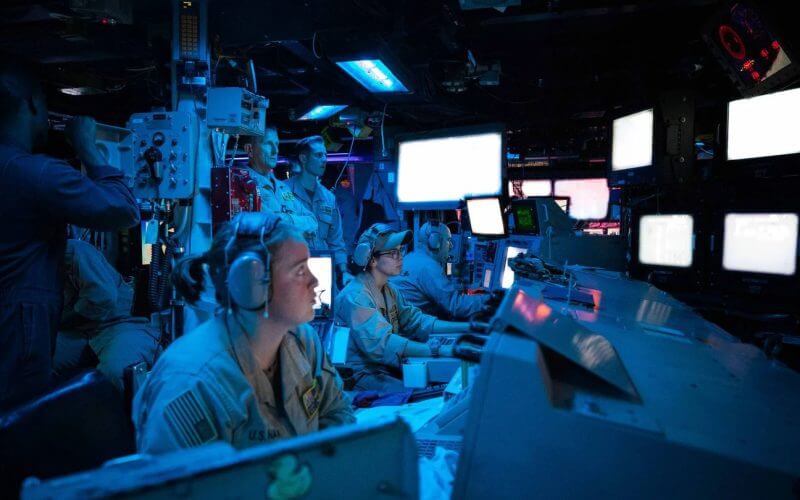Over the weekend, the United States Navy positioned the Dwight D. Eisenhower Carrier Strike Group from the Persian Gulf into the Gulf of Aden, off the coast of Yemen, following recent attacks from the Islamic Republic of Iran-backed Houthi terrorist group.
According to reports, the move by the U.S. Navy is a measure against the Houthis, who have disrupted international shipping in the Red Sea and the Persian Gulf with their daily attacks against commercial vessels. Speaking to Politico, two anonymous Pentagon officials said that "top Biden administration officials are actively weighing options to strike back at Houthis in Yemen."
The sources also told Politico that the U.S. military "provided options to commanders to strike the Houthis."
“The whole premise of this administration's Iran policy was supposedly to reduce escalation risk from the Middle East and Iran's proxies so that U.S. forces and aircraft carriers could deter Russia and China,” explained Gabriel Noronha, a former U.S. State Department advisor on Iran during the Trump administration.
“The reverse has happened - appeasement has created a frenzy of terrorist attacks forcing the U.S. military back into the region to restore some semblance of security,” he told The Foreign Desk.
Pentagon officials confirmed this weekend that a U.S. warship in the Red Sea stopped a kamikaze drone attack by Houthi drones.
In a public statement, the Pentagon said that the USS Carney "successfully engaged 14 unmanned aerial systems (UAS) launched as a drone wave from Houthi-controlled areas of Yemen."
The Biden White House has thus far refused to strike back at the Houthis, fearing that the Islamic Republic of Iran would call upon its terrorist proxies in the region and drag the U.S. into a costly war in the Middle East region.
"The UAS were assessed to be one-way attack drones and were shot down with no damage to ships in the area or reported injuries," the Pentagon statement read.
“Biden still won't let the U.S. military strike the Houthis or other terrorists in a manner that will actually restore deterrence - it's just weak tit-for-tats that will ensure the cycle of violence perpetuates itself,” Noronha explained.
Following the Oct. 7 massacre, the Islamic Republic of Iran has called on terrorist proxies in Lebanon, Syria, Iraq, and Yemen to support Hamas against Israel.
During the early weeks of the conflict, the Pentagon increased its presence in the Mediterranean, moving several destroyers to deter Iranian proxies in the region.
Despite the Pentagon's decision to move the carriers to the Mediterranean, the Houthis, and other Iranian proxies continue to voice their support for Hamas and provide support to the group as Israel continues its ground incursion into the Gaza Strip.
Last week, a Houthi drone struck the Al Jasrah, a Liberian-flagged Motor Vessel based in the Red Sea, causing a fire. That same day, Houthi forces also launched several ballistic missiles toward the Bab el-Mandeb strait, which struck another Liberian-flagged Motor Vessel, the Palatium 3.
On Friday, Biden National Security Advisor Jake Sullivan blamed Iran for supporting the Houthis in their attacks against commercial shipping in the Red Sea and called on Tehran to "take steps themselves to cease these attacks."
Despite verbal warnings from the U.S., Tehran has reiterated its support for the Houthis and has threatened the U.S., Israel, and other Western allies should they continue to provide support for Israel.
Defense Secretary Lloyd Austin and Chairman of the Joint Chiefs of Staff, General Charles Q. Brown, will travel to the Middle East this week, visiting leaders in Israel, Bahrain, and Qatar to discuss ongoing developments in the Middle East.
Related Story: Houthis Ramp Up Attack Against American Forces in the Red Sea










